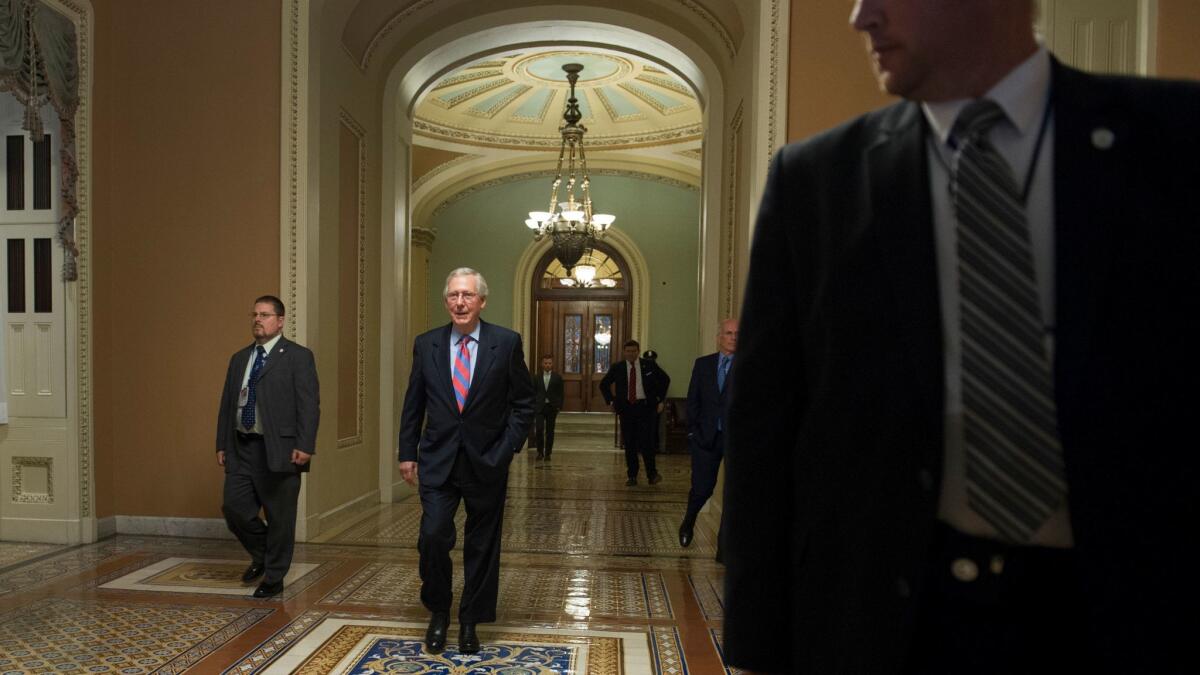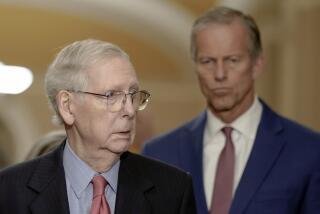Op-Ed: Mitch McConnell: Architect of failure

Mitch McConnell is helping the Trump presidency fail. That’s not the outcome the Senate Republican leader intended, of course. But that’s what he achieved last week when he presided over the apparent collapse of his party’s seven-year campaign to repeal Obamacare.
Presidents succeed when they deliver on their core campaign promises, and tend to fail when they don’t. A president who thinks strategically tries to begin his tenure with a legislative victory, to bolster an image of competence and strength.
Instead, President Trump’s first big legislative effort just ended in a stinging loss. There’s plenty of blame to go around, but McConnell, the owlish Kentuckian with a now-dented reputation as a legislative wizard, was the man in charge.
What went wrong?
First, McConnell and his Republicans had no plan — in part because they never expected Trump to win the presidential election. That meant many GOP senators had never done the hard work of figuring out what kind of Obamacare replacement they wanted, and what compromises they might accept if they ever had a chance to negotiate. There was no consensus about the kind of policy outcome they were seeking, beyond something they could call “repeal.”
He was mourning more than merely the failure of one attempt to repeal Obamacare. He was seeing an entire legislative program heading into danger.
Second, McConnell didn’t use the regular legislative process. Instead of sending healthcare to Senate committees for deliberation, he assembled a panel of 13 GOP senators, all white men, to write a bill behind closed doors.
That had two effects. It locked Democrats out of the process. And it offended Republicans who weren’t included.
There was a pragmatic reason for the backroom process. McConnell and House Speaker Paul D. Ryan decided to make Obamacare part of a budget bill that would need only 51 votes to pass. That, they thought, meant they wouldn’t need any Democratic help, so they didn’t even try to take a bipartisan approach. The strategy would also allow them to make the bill a vehicle for cutting taxes.
But the strategy backfired. Sen. John McCain of Arizona complained that the leadership produced “a proposal behind closed doors in consultation with the administration, then [sprang] it on skeptical members, trying to convince them it’s better than nothing” — a direct rebuke to McConnell.
Finally, the process went from bad to worse, culminating in a grotesque proposal — the “skinny repeal” — that McConnell promised would never become law. He asked Republican senators to ignore its substance and vote for it as an act of pure party loyalty. Three of them — McCain, Lisa Murkoswki of Alaska and Susan Collins of Maine — refused.
McConnell was not the only architect of this failure. Trump helped. Although the president exhorted Republicans to pull together behind something, it was clear he didn’t really care what the something was. His lobbying effort consisted largely of warning GOP dissidents that he’d punish them if they didn’t fall in line. And the bluster didn’t sway the three holdouts.
Indeed, it’s hard to avoid believing that McCain relished the chance to defy a president who had not only derided him for being captured during the Vietnam War, but accused him of neglecting veterans.
The impact of this failure is bigger than just Obamacare. It hampers the prospects for the rest of Trump’s ambitious legislative agenda — including the centerpiece of the administration’s economic program, a massive tax cut.
On the coming tax bill, just as on healthcare, Trump and GOP legislators haven’t settled on specific goals. Just as on healthcare, they hope to pass the measure with only Republican votes. In other words, they plan to try the same strategy over again, hoping for different results.
Right now, that doesn’t seem likely to work. For one thing, Democrats have been emboldened to resist. And Democratic base voters, energized by the Obamacare fight, will demand that they do.
For another, as the Trump administration careens sideways, Republican legislators are feeling freer to push back. Last week, for example, they passed a bill imposing new sanctions on Russia that the White House initially opposed.
Who can blame them? They’re dealing with a chaotic White House that can’t seem to manage internecine staff squabbles, much less a legislative strategy. They seem less enthusiastic than before to defer to the wishes of a president whose popularity may still be sinking.
McConnell is famous for rarely displaying emotion. But on Friday, as he announced at nearly 2 in the morning that his effort to repeal Obamacare had failed, the Kentuckian’s voice wavered and nearly cracked.
“This is a disappointment,” he said. “A disappointment indeed.”
He was mourning more than merely the failure of one attempt to repeal Obamacare. He was seeing an entire legislative program heading into danger.
Without a victory somewhere, McConnell, Ryan and Trump won’t have much to show voters in 2018. They’ll rail at Democrats for obstruction, of course. But they’ll have only themselves to blame.
Twitter: @DoyleMcManus
Follow the Opinion section on Twitter @latimesopinion or Facebook
More to Read
A cure for the common opinion
Get thought-provoking perspectives with our weekly newsletter.
You may occasionally receive promotional content from the Los Angeles Times.











